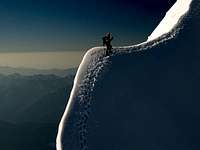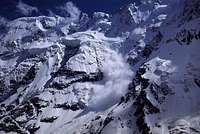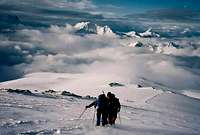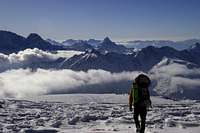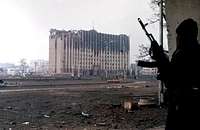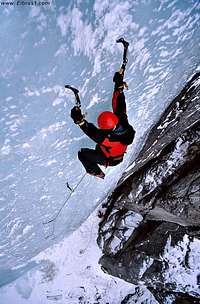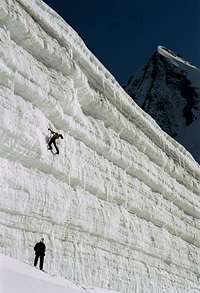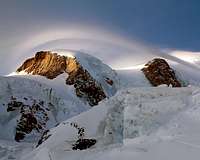|
|
Area/Range |
|---|---|
|
|
42.78730°N / 43.72560°E |
|
|
Hiking, Mountaineering, Ice Climbing, Scrambling, Skiing |
|
|
Spring, Summer, Fall, Winter |
|
|
18514 ft / 5643 m |
|
|
Updates on the Caucasus page
General Introduction
The Caucasus (Russian: Кавказ - Kavkas.
Georgian: კავკასიონი - Kawkasioni).
For non mountaineers, nowadays unfortunately many times known as "Chechnya" and for political unrest, guerrilla warfare and the Russian dilemma.
For some mountaineers, especially for those who mostly climbed in the European Alps, the Caucasus is a safe haven to escape the overcrowded peaks in the Alps. The Caucasus is able to seduce mountaineers from all over the world by offering a vast variety of easy and also very difficult ascents up to Russian Grade 6A. Climbing in the Caucasus is a scenario you won’t find so often in the Alps. Climbing on a beautiful mountain wall and no other party in sight.
With Elbrus, the Caucasus also has the hightest elevation (5643m) of Europe. Although Mont Blanc also claims the title of highest mountain of Europe, today it’s mostly accepted that Elbrus is the highest mountain on the continent. Read more about this in the proper section: Mont Blanc-Elbrus dispute
General Features
Geography
The mountain range is located in four countries (Armenia, Azerbaijan, Georgia and Russia) that makes the Caucasus an international mountain range. It is over 1100 km long and reaches from the Black Sea to the Caspian Sea and is said to be one part of the border between Europe and Asia. The Caucasus has a great variety of flora and also fauna. 17 types of mountain plants are only found in the Caucasus. Lucky mountaineers can still glimpse a look or two at a wild mountain bear.
Basically geographers divide the Caucasus into "Greater Caucasus" and
"Lesser (or Minor) Caucasus".
The Greater Caucasus, as the name already suggests, is the major range
which reaches from the Black to the Caspian sea. In some places it's over 160km broad and is divided into several minor mountain ranges.
The "high Alpine Caucasus" which, for mountaineers, is the most interesting part of the range is located south of the Black Sea Caucasus. With peaks like Elbrus, Shchara or Kazbek and many other peaks over 5000m the highest elevations are found here.
The Lesser Caucasus runs parallel to the major range (approximately 100km south) is located in Armenia, Azerbaijan and Georgia. The highest peak of Lesser Caucasus is Aragats in Armenia with 4.095 m.
Sometimes geographers say that the Lesser Caucasus isn’t an individual mountain range but is part of the north-anatolian and north Iranian mountain chain.
Climate
The Caucasus is known for the huge masses of snow which falls on the slopes of the mountains. This is due to the geographical location of the Caucasus. Its encased by the Caspian and the Black sea and those oceans are pushing clouds into the center of the Caucasus.
But the same two oceans are responsible for the fact that the far ends of the Caucasus, especially in the far east in Dagestan, are very dry.
Population
The Caucasus is a region of cultural diversity which apparently is
causing a lot of problems. Approximately over 50 different peoples are living there.
The major religion is Christianity (whether Russian-orthodox or Armenian – orthodox).
In some areas the religion can be an issue, in others not. In Tbilisi for example, you can find mosques, churches and synagogues in the same neighborhood and according to the people I spoke to there was no friction in between the different ways of belief.
Ethnical background seemed to be a bigger issue. Many times I was informed if the person I spoke to was Azeri, Armenian or whatever in sentence number two. Number one was usually; where are you from?
History and today's situation
The Causasus region has always been a ethnical and political trouble spot. At the end of the 7th century the Arabic empire started to annex southern regions of the Caucasus, during the 16th century the Osmanians came and finally in the 19th century the Russian empire started to fight against the mountain peoples in the Caucasus. In a war lasting over 60 years they finally managed to bring peace to the northern Caucasus region. Famous is the resistance of the Chechnyan leader Imam Shamil during the 19th century.
Since almost ever the Caucasian people wanted to be independent and the situation in the Caucasus has been unstable since the first conquerors came.
Today, after two devasting wars in Chechnya and warlike situation in regions like Dagestan, Caucasus is not known for cultural diversity but also for war, violation of human rights and actions of inhumanity. Unforgotten are the pictures of destroyed Grozny and the Christmas bombings. Today it seems as if dialog is far away between the two parties but instead terrorists kill children and Russian tanks drive through Grozny.
Therefore every visitor should not only see rainbows because of the beautiful mountains, but he should also be aware of the tremendous problems a lot of people have to face in the Caucasus.
Personal Security
A lot of people on this website seem to be concerned about the security situation in the Caucasus.
The following should make a halt to some prejudices.
The Caucasus still is a trouble spot and represents the poorest of Russias, Georgias and Azerbaijans regions but as for the fact that the Caucasus is in no way a homogenous region it is important to differ. Consisting of several republics (administrative units within the Russian Federation with high amount of authonomy) and countries travel recommondations can differ every 200km.
In Russia all Republics, ecxept Ingushetia, Chechnya and Dagestan, can be considered as reasonable secure. Although even Chechnya and Dagestan nowadays are not as serious anymore and their reputation is much worse as their real situation. Ingushetia on the other hand I would consider a real no go. All the problemes of Russias Caucasus seem to unite there, with almost weekly serious incidents, the world knows nothing about.
North Ossetia-Alania, with it's breathtaking Zei valley, unfortunatly got bad reputation due to the armed conflict in South Ossetia. North Ossetia, except refugees and Russian troops on the move, did not see the war though.
Karbadino-Balkaria and Karachaevo-Cherkessiya are already very welcoming regions and you will encounter little problems because regions like Prielbrus (where Europes highest is located), Besengi or Dombai see a lot of tourists and are already kind of used to it. Due to that of course other annoyances evolve. Some people will probably try to take advantage of you, especially the Russian police is very very annoying in this respect. Just stay calm, say you don't understand, and don't pay anything.
The situation in Georgia is complicated. Not due to the fact that it's very insecure but because it is very unclear where you can actually travel and where to not. You will hardly be able to enter South Ossetia and Abkhazia. Reaching Kazbek is still no problem and the area is considered reasonably safe.
Russian-Georgian Border area. I don't want to give any recommendations because it is possible to go there, for example to Ushba by not telling the soldiers where you actually go but definitly a lot more problematic than before the war in South Ossetia and if somebody finds out that you are crossing the border from Russia to Georgia, you are more likely to get serious problems now. This information is very vague though, because of the general information lack in the area.
Security concerns should not prevent you from travelling to the region, especially not from climbing Elbrus. Be aware though that the Caucasus is still not a stable region and the conditions are harsher than in Western European countries. Unfortunate events can happen, but if you behave normaly and don't attract to much attention you'll have a nice time climbing these wonderful mountains.
Information on Azerbaijan and Armenia will follow.
Getting to the Caucasus
From Russia to the Caucasus
The most common way to arrive in the Caucasus is by air. Mineralny Vody (which literally means mineral water) is the main airport close to the mountains.
The city is well connected with both Moscow and St. Petersburg and Pulkovo Airlines as well as Aeroflot are flying there on a frequent basis and on a
moderate price. Today Pulkovo Airlines is often recommended because it is the main "inner-russian" airline. Unfortunately the airport in Mineralny Vody is infamous for police officials trying to get bribes, so make sure all documents are in perfect order.
You can also land in Naltchik.
What's important after arriving wheter in Mineralny Vody. Cheap train rides is the other option and you can buy a ticket from most major towns of Europe to for example Min Vody.
From Georgia to the Caucasus
Coming soon !!
Red tape and visa regulations
Introduction
Unfortunately, it's not just to pack your bags and go to the Caucasus. All four Caucasian countries still have old style visa regulations.
I'm not really updated on the situation, but the following are my experiences when going there.
How to get a visa
Russia - different visa price for different nationals. Somewhere between US$ 20 and 80. A visa invitation is usually needed. Sometimes you're obligated to pre-book hotels and supply the Russian embassy with a dettailed itinerary.
No climbing permits, but border permits and national park fees in some places.
It is sometimes hard to get a invitation. Usually you can get one from the hotel you stay at (in Moscow or St. Petersburg).
If you don't have a hotel there you can obtain a visa ivitation via http://www.visahouse.com
If you don't know who to contact in your home country to get the proper visa you can look up your consulate here http://www.russianembassy.net/.
Armenia - The visa for Armenia is 30$ if arrive in Yerevan airport and on the land border crossings (at least those with Georgia) - no letter of invitation required. If arrving overland, check the latest visa news with an Armenian embassy as there are lots of changes all the time.
Azerbaijan - US$30 and a letter of invitation. It took me 2 days to get it in Ankara.
Georgia - US$40. No letter of invitation. The visa was in my passport before I had handed over the cash.
Another very usefull link for information about Russian and all other CIS visas is http://www.visatorussia.com/
Mountaineering centers
Alplager Bezengi (Альплагер Безенги)
Bezengi, is according to my knowledge, the last of the Soviet era alpine bases which is still running. It was here the alpinists in the mountaineering schools started to climb the really difficult peaks and got a higher levels of alpine education. When the alpine students had reached a certain level, they were judged ready for more difficult and especially higher summits. The Pamirs with peaks over 6000 were the next destination. There were different types of exams and a medal system. Nowadays you can
still climb for certain types of diplomas. For example to achieve the Silver Stars of Bezengi, you have to climb all the 5000m peaks in the area.
See here for details.
The information building in the base have a good selection of maps and route descriptions and the personal that works there, have very good first hand knowledge about the routes.
If you want to climb a route harder than 4B, you're obliged to bring a walkie-talkie (free of use, supplied by the base) and report back at pre-set intervals.
- Bezengi Alpine Base - official site.
- A site about Bezengi.
- Vladimir Kopylov's site about Bezengi.
- A map of the Bezengi area
Route information
Here you can find informations about possible routes in the area of the Bezengi camp and the Bezengi wall.- Sketch of routes on the northern massif of Bezengi
- Sketch of routes on the Bezengi Wall
Three interesting articles about climbing in Bezengi. - Koshtan North Ridge 4B
- Mizhirgi West 5 A
- Pushkina North Face 5B
Alpine Camp Shkelda (Шхельда)
Located in the Adyl Su Valley the Alpine Camp Shkelda is important for climbing mountains like Ushba or Peak Shkelda.
Elbrus – Mont Blanc dispute
The question basically is: Is the Caucasus the real physical border of Europe and if it was is the Caucasus therefore actually a part of Europe or a part of Asia ?
If the Caucasus would be a part of the grand continent Asia it would merley be a minor mountain range but if the Caucasus was a part of Europe it would be the greatest mountain range there.
So we might assume that it's actually not a question of hight it's a question of reputation and pride.
France or Russia. Both fearing to loose the highest mountain in Europe.
There is a nice german article article on the net trying to discuss the problem from three angles. The geographical, the policital, and the historical point of view.
1. Geographially we can't solve the conflict because actually there is no border between Asia and Europe. It's one big fat tectonic plate. (Eurasia)
2. We can't solve the conflict by looking at politics either. Politial borders are unstable and unsure. They change with time.
3. Last but not least. History. Unfortunatly history is no solution either. Hundreds of different borders were seen in history. None fully accepted none fully denied.
Several publications argue the Kuma-Manych Depression (300 km north of the Caucasus) between the Caspian Sea and the Black Sea is regarded boundary between Europe and Asia.
Conclusion ?
Believe what you want. You will be wrong and at the same time you'll be right.
As far as we can see it does not matter which mountain is the highest. Whether Mont Blanc or Elbrus, one fact still remains: Mountains are just awesome and it simply should not bother us too much.Trekking
The area is not only for hard core moutaineers. The valleys are lush and green and it's popular to walk and trek from valley to valley. It's also and old Russian tradition to go "pass walking". That's one of the reasons also the passes has its own grading system.
NC: Anyone can walk a pass of NC grade.
1A: A pass with steepish passages on a good track.
1B: A steep path on a roughish path. Might involve some scrambling. If snowy, crampons may be used.
2A: Scrambling and easy climbing. Ice axe and crampons is a must if snowy.
2B: Some technical climbing and only persons with climbing background should consider these passes.
3A: Passages of serious climbing. More advanced gear is a must. Obejective danger may be an issue.
3B: Sustained technical difficulties and possible serious objective dangers. Climbing difficulty up to UIAA grade VI.The most important peaks
The highest peaks in the Caucasus - Elbrus - 5643m - A volcano. The highest peak in the Caucasus and therefore also the highest in Europe. A Seven Summits peak and also included in the Volcanic Seven Summits.
- Dychtau - 5204m - Well known for its dangerous and tough north face. A difficult climb.
- Koshtan - 5151m - The long ridge traverse on the peak's northern crest is a fine target for any alpinist with experience.
- Pushkina - 5100m - A difficult side peak of Dychtau, located in the northern massif of Bezengi.
- Shchara - 5068m* - Marks the eastern end of the Bezengi Wall and is a difficult target for any mountaineer.
- Dzhangi - 5058m - A high and difficult peak in the middle of the Bezengi Wall.
- Kazbek - 5033m** - The highest peak solely on Georgian territory. It's the highest peak in the eastern part of the Caucasus.
- Mizhirgi - 5025m - A difficult peak in the Northern Massif. Shevshenko's "Kaskad", a 6A route is supposed to be one of the hardest in all Caucasus. The Mizhiri Glacier is nearly as popular as Mizhirgi himself.
* There's a lot of debate about Shchara's elevation. May well be the third highest summit in Europe. More info about this to be added later.
** The Georgian name of the peak is Mkinvartsveri
Other important peaks- Gestola - 4860m - One of the most famous peaks in the Bezengi Wall. The normal route is of moderate difficulty and therefore the peak recieve a lot of ascents.
- Ushba - 4710m - Possibly the climb with most prestige in all of Europe and for sure in the Caucasus. The peak is a very hard climb and also beautiful to look at.
- Misses Tau - 4410m - The steep, but straight forward north face is many times used as a training peak for the really difficult summits in Bezengi.
- Aragats - 4090m - Armenia's highest peak.
- Gumachi - 3823m - One of the most climbed peaks in the Caucasus. An easy ascent which makes it a perfect target for beginners and for acclimatization for Elbrus.
-
Literature
- Vladimir Kopylov, the person who really knows the mountains of the Caucasus has written a book called Forbidden Mountains - The most beautiful Mountains of Russia and Central Asia.
- My climbs in the Caucasus a classic mountaineer's account about climbing in the Caucasus a very long time ago.
- Classic climbs in the Caucasus. Climbing info by Friedrich Bender.
Important towns for Caucasus travelling
Important towns in Russia: - Moscow and St. Petersburg (important stop-over towns)
- Mineralny Vody and Naltchik (airports in the Caucasus)
- Matchkala (capital of Dagestan, of interest for trekkers)
- Grozny (infamous capital of Chechnya)
Important towns in Georgia - Tiblisi
Important towns in Azerbaijan - Baku
Important towns in Armenia - Yerevan
-
Maps
Lots of maps can be found on Mapserver.
An overview map of the Caucasus
A link collection
Russian Grading System



